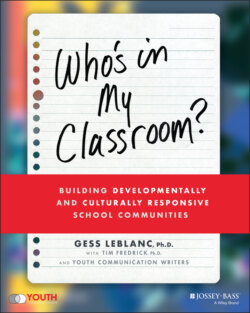Читать книгу Who's In My Classroom? - Tim Fredrick - Страница 21
2. Enhance your knowledge of how your students develop and learn.
ОглавлениеThis chapter has focused on the importance of having a better understanding of our students so that we can better support them in school. One key component of understanding who they are is understanding how they develop. A wonderful resource for learning more about child development is Harvard University's Center on the Developing Child (https://www.developingchild.harvard.edu/). There, you'll find a resource library that includes current research in the field of child and adolescent development and specific tools and guides for supporting students’ developmental needs. Another important and related resource is the Yale Child Study Center (https://www.medicine.yale.edu/childstudy/). Their Center on Social and Emotional Learning has been a leader in developing evidence-based practices to support the social and emotional needs of youth and adults.
To better understand how students learn and to better support the learning needs of atypical learners, I often rely on the work of Understood.org (www.understood.org). This site provides a detailed approach to identifying and supporting students’ learning needs.
Special education teacher Ms. Ackert was able to provide high-quality support to Irving Torres, 18, in part because her school implemented a structure that helped teachers get to know students better. He writes:
Ms. Ackert ended up being my teacher for three years, through 8th grade. I learned more in those three years than I thought possible. I attribute that to Ms. Ackert's skill as a teacher, but also the fact that I was fortunate to have a continuing relationship with one teacher who really knew me. This process of a teacher working with students for multiple years is called “looping.”
Looping is a great way to make students more interested in school. [In 7th grade], since Ms. Ackert and I had known each other for over a year, every time she spoke to me during class or asked me a question, she geared the question or assignment specifically to me, which made the work way more interesting.
To gain a better understanding of how students learn, I also ask them specific questions, including: (1) What are things that teachers do that help you to learn?; (2) What are some things that make it more difficult for you to learn in school?; and (3) What are the things that you would like to learn more about? Obviously, Irving would reply that a teacher who knew him enough to match schoolwork to his level and interests is an effective teacher. In another story, Irving described how valuable it was for him when Ms. Ackert stepped in to quickly squash stereotyping and bullying of special education students.
